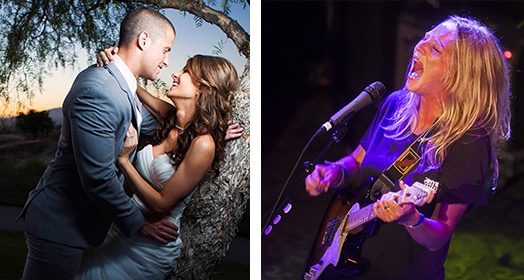Event photography is the primary source of business for most professional photographers. Capturing the important moments in a concert, wedding, or sporting event requires planning and a mastery of equipment, lighting, and location. In this course, you'll learn practical skills for managing paid event photography shoots. Working with a professional photographer, you'll learn how to approach projects professionally and deliver the client a high quality product.

Course At A Glance
Course Features
- 100% online
- Project-based
- Instructor-led
- Credit-bearing: 3 Credits
- Classes start January, April, and August
Instructor(s)
The course is taught by the following instructor(s):
Take this course as a standalone or as part of the following program(s):
Course Projects
Event Photography
Event photography is an exciting and challenging area for any photographer. In this lecture, you'll learn what event photography is all about. We'll discuss general project management principles for event photography and examine camera and other equipment requirements for course projects.
Live Performance Photography
This week, we will discuss how to photograph a live performance, a category that can include musical concerts, dance performances, stand-up comedy, and poetry readings. These events can vary from world-famous artists in large stadiums to unknown artists in a small bar or cafe. While these sound like very different challenges, there are many similarities from a photographic standpoint.
Sporting Events
Covering a sporting event keeps you on your toes. To capture the important moments in a game, you need to be able to anticipate the action. What makes shooting sports different from shooting other events is the pace of the action, the excitement of the players and fans, and the challenge of getting close to the action in large sports venues. In this lesson we'll deal with tips for finding and working with clients, selecting the right equipment, and adapting to different kinds of typical lighting conditions.
Wedding Ceremony and Portraits
We have finally reached the biggest of category for event photography: weddings! Some photographers hate shooting weddings, and some love it, while others are indifferent. In this lesson, you'll learn tips for finding and working with wedding clients. Cameras, key moments, and troubleshooting common issues are key topics.
Wedding Receptions and Parties
In this lecture, we will cover how to shoot wedding receptions and parties. A wedding reception is basically a large party and the same rules apply to both events. Receptions and wedding parties are both held indoors and in low light, making a flash or speedlite a necessity. Here, you'll learn tips for meeting with and booking potential clients, choosing gear and capturing the key moments at a wedding reception or party.
Finding Your Professional Presence
Being a superb photographer alone will not make you a dime; you need to find your professional niche and spend time working on the business side of things. The good news is that with talent and hard work, it can be a great career. In this final lesson you'll gain a professional perspective on finding your niche as a photographer, including using Web-based marketing to find potential clients and how to generate income by selling and prints and products.
Sample Student Work
 by Tanner Watson
by Tanner Watson
Course Outcomes
What Are The Course Projects?
Creative and career-focused photoshoot projects include concerts, sporting events, wedding, and official ceremonies.
What Software or Supplies Do I Need?
- Computer with Internet connection.
- Access to a standalone digital camera with manual control over ISO, Aperture, Shutter Speed, and White Balance, that allows for shooting in RAW format.
What Will I Learn?
Students in this course can expect to learn to:
- Find event photography clients in the following genres: live performance, sporting events, wedding and portraits, and wedding reception and party.
- Identify and summarize what a photography client needs, when they need it, and in what form you will deliver the files.
- Create an initial plan of your equipment and setup needs for a photo project, listing any special equipment you will need to bring and noting any lighting or setup goals.
- Successfully execute classic shots and/or shots that meet the client's stated needs.
- Conduct event photography shoots in live performance, sporting events, wedding and portraits, and wedding reception and party genres, or comparable projects.
- Reflect on your photo shoot experiences and learn lessons that will benefit your future projects.
- Present your best work from event photography shoots to potential clients.
- Promote your work on online market places and on third party product sites.
Getting Started
Course Registration
- Classes start January, April, and August
- 3 Credit Course
- Project-Based: Exercises, Discussions, and Critiques
| Course Tuition and Fees | |
|---|---|
| Tuition | $510/credit |
| Registration Fee* | $200 |
| Total Course Price | $1730 |
Registration fees are nonrefundable after 5 days from enrollment. All tuition includes a digital materials fee for course content.
Course Registration Form
To register for this course, use the form below to enter your information and desired start date. An Admissions Advisor will contact you to arrange payment and provide you with an Enrollment Agreement.
Frequently Asked Questions (FAQ)
What Are The Courses Like?
Our courses are project-based. In each course you’ll enjoy a series of lectures, projects, discussions, and critiques designed to stretch your creative skills, earning college credit for your completed course.
How Much Time Do I Need?
Classes start January, April, and August, and this course can be completed in a 15-week term. College credit from this course can be applied to a range of degree and certificate level programs at Sessions College.
Who Are The Instructors?
Our courses are developed and taught by our faculty of professional artists, designers, and photographers. This means that you’ll learn in-demand skills, get feedback on your work, and build a portfolio of creative work.
Is Sessions College accredited?
Yes. Since 2001, Sessions College has been accredited by the Distance Education Accrediting Commission (DEAC). The Distance Education Accrediting Commission is listed by the U.S. Department of Education as a recognized accrediting agency and is recognized by the Council for Higher Education Accreditation (CHEA).

